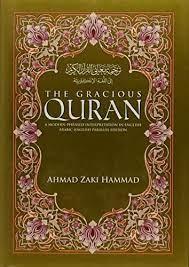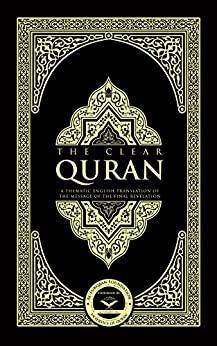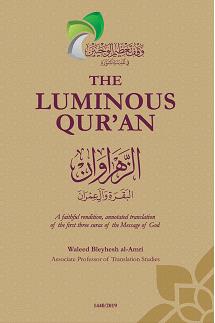(MENAFN- Kashmir Observer)
By Dr Tauseef Ahmad Parray
In the last two decades of 21 st Century, many new English Translations of the Qur'an have been produced by the Muslims in the chaste and accessible idiom of the day
IN CONTINUATION WITH THE PREVIOUS COLUMN (dated 23rd April 2022), below is presented an assessment of three (3) more English translations of 21st century by the native Arabs. These are: Ahmad Zaki Hammad's The Gracious Qur'an (2009 [2007]); Mustafa Khattab's The Clear Quran (2016); and Waleed B. Al-Amri's The Luminous Qur'an (2019).
Ahmad Zaki Hammad, The Gracious Qur'an: A Modern-Phrased Interpretation in English. Arabic-English Parallel Edition, Third Print (Lisle, LA, USA: Lucent Interpretations, 2009 [2007])

Ahmad Zaki Hammad (b. 1946) is a renowned Islamic scholar/authority on the Qur'anic and other Islamic sciences. He received his graduation (Almiyyah) from Faculty of Theology, Al-Azhar University (Cairo) and doctorate in Islamic Studies from University of Chicago (USA). He teaches Islamic civilization and major Qur'anic sciences in Faculty of Languages and Translations, Al-Azhar University. He has authored number of books, particularly on the Qur'anic studies.
His English translation of the Qur'an, The Gracious Quran: A Modern-Phrased Interpretation in English (2009 [2007]), has seen, in less than a decade as many as 21 editions. It has, thus, set a new record as the“most popular English translation of the Qur'an” and has been estimated (in Kidwai's words) as a“deep and sincere concern and meeting almost all needs of the uninitiated English speaking readers of the Quran.” He also has provided widespread and beneficial background information, preparing readers better for grasping the meaning and message of the Qur'an. The translation is overall evaluated as“elegant and reader-friendly” being written in“lucid, idiomatic English”,“opted for paraphrases, rather than literal translation of the Qur'anic text” and his explanatory notes in particular and the whole work in general is“truly a treasure house of sound Qur'anic scholarship” and“a monumental English translation”.
As a sample, here is the translation of Surah al-Ikhlas from Hammad's Translation:“Say: He is God. One. God, the Everlasting Refuge. He does not beget. Nor is He begotten. And comparable to Him, there is none.” (Q. 112: 1-4)
Hammad's claims that he has attempted to provide an idiomatic English translation“with highly reliable accuracy”, with implicit intent“conveyed with a light hand in unobtrusive brackets” so that to make its“reading easy, clear, accessible, and … not inelegant—free of poetic pretension, philosophical complication, and lifeless literalisms”. This can be seen, for example, in Q. 2: 2:“This is the ‹Book of God›. There is no doubt therein”.
Mustafa Khattab, The Clear Quran: A Thematic English Translation of the Message of the Final Revelation (Lambard, IL, USA: Furqan Institute of Quranic Education, 2016)

Mustafa Khattab (b. 1977) is a Canadian-Egyptian scholar, an imam and university chaplain, and is considered an authority on the Qur'anic interpretation. He memorized the entire Qur'an at the young age, and later obtained Bachelors', Masters and doctorate degrees in Islamic Studies from Al-Azhar University (Cairo). He is the Fulbright interfaith scholar and Imam in the USA and Canada since 2007 and has authored number of books.
Khattab's English translation of the Qur'an, The Clear Quran: A Thematic English Translation of the Message of the Final Revelation (2016) is commendable work and does ample justices with its title. In Kidwai's estimation, it has number of qualities like“reader friendly”,“easy to understand” and“succeeds largely in bringing out the meaning and message of the Quran.” His command over Arabic (mother tongue) and English (the target language and his experience of several years in West) have contoured the mindset of his target readership. Some of the important feature of his translations highlighted by Kidwai are: (i) A detailed note on the structure, style, proper names and pronouns in the Qur'an; (ii) Answers to some frequently asked questions about Islam; and (iii) insertion of imaginative icons in content pages listing the titles of 114 Qur'anic chapters, which identify as to which Surahs deal with doctrines, stories and the unseen etc. A valuable feature of the work is brief explanatory notes which“enable readers to fathom better the Qur'anic terms, concepts and personalities”, and are highly relevant in modern era. Overall, his translation is“above literal translation”,“lucid and idiomatic” and“easy to understand English.” Kidwai places Khattab's translation“in the enviable category of the very few English translations … recommended to readers, Muslims and non-Muslims”, and thus praises the translation for offering readers with“the gems of Quranic guidance in their own preferred idiom”.
As a sample, here is the translation of Surah Al-Fatiha from Khattab's work: All praise is for Allah—Lord of all worlds, the Most Compassionate, Most Merciful, Master of the Day of Judgment. You alone we worship and You alone we ask for help. Guide us along the Straight Path, the Path of those You have blessed—not those You are displeased with, or those who are astray.
Kidwai, in his God's Word, Man's Interpretations, is of the opinion that among all the translations of the Qur'an, the translations of Abdel Haleem, Hammad, Khalidi and Khattab have, collectively and in comparison to others,“succeed[ed] remarkably in conveying the import of the Quran” by presenting“the true meaning and message of the Quran in chaste, easy to understand English”, which is lucid and idiomatic.
Waleed B. Al-Amri, The Luminous Qur'an: A faithful rendition, annotated translation of the first three suras of the Message of God (Madinah, KSA: Endowment for Cherishing the Two Glorious Revelations, 1440/ 2019)

Waleed Bleyhesh al-Amri is presently an Associate Professor of Translation Studies in the Department of Languages and Translation, College of Arts and Humanities, Taibah University (Madina). He has Masters and doctorate in Translation Studies from Salford University and Manchester University (Britain), respectively. He has to his credit several publications on translation studies. He has command over Arabic and English languages, knowledge of the different nuances of translation and is specialist and expertise in the 'critique of Qur'an translations'. His translation, The Luminous Qur'an, is (as its sub-title clearly reveals),“A faithful rendition, annotated translation of the first three Surahs of the Message of God”, which presents an easy-to-understand, lucid, and much faithful English rendering of first three surahs (Q. 1—3: 493 verses)—namely al-Fatihah, al-Baqarah and Al-'Imran: the latter two are collectively known as 'al-Zahrawan' (literally 'Two Luminous Surahs'), hence the title 'The Luminous Qur'an'. This translation project is sponsored by Endowment for Cherishing the Two Glorious Revelations, Medina and is named as The Grand Qur'an, of which The Luminous Qur'an is only the first step.
This translation represents, as al-Amri claims,“a safe, mainstream yet non-restrictive understanding of the Message of the Grand Qur'an”, which is“marked by its 'faithfulness': neither too literal nor too free” but is“as reflective of the Original as humanly possible”. It also claims to be“in modern-day, non-banal, idiomatic, educated English”, free from“being archaic” and is“easy to understand to a reader”. Preceded by a number of introductory sections on different aspects of Qur'an, its translations and interpretations which help in understanding both the Sacred Text as well as the importance of translations and exegesis, Amri's Translation is very lucid and idiomatic.
One of the unique features of Amri's translation, similar to that of Hammad, is that he occasionally adds single quotation marks (`…`) to make clear the meaning of some terms, phrases, or the whole verse: e.g.,“`Only` you we worship, and `only' You we seek help from” (Q. 1: 5);“… believe as `other` people believed” (Q. 2: 13); and“He is the One Who forms you in `your mother's` wombs as He wills” (Q. 3: 5). Al-Amri has supplemented the translation with ample footnotes which help in comprehending the content and context of the specific verse.
Taking into consideration all these features, one must not hesitate to say that al-Amri's effort clearly validates and rationalizes the translation's sub-title and justifies his claim to have presented a“non-restrictive understanding of” the Qur'an, which is“neither too literal nor too free” but is“reflective of the Original” Sacred Text. Though it has many similarities with other translations, however, it is unique in many ways as well.
Amri's translation is described as being“remarkable for its dominant concern with representing the mainstream Muslim understanding of the message of the Qur'an in English”. Al-Amri, for Kidwai,“has sound credentials to embark upon translating the Qur'an” and“he has been successful in conveying the meaning of the Qur'an in chaste English, which should enable readers to comprehend the contents of the Qur'an and derive guidance from it”, and he“deserves credit for having introduced an innovation: placing the extra-Qur'anic material within single quotation marks, rather than inserting the same in parentheses”.
In sum, all these five (5) translations by the native Arabs, which have been praised by many scholars and critics equally, present the true meaning and message of the Quran in a chaste, easy to understand English, which is lucid and idiomatic.
The author is Assistant Professor, Islamic Studies, at GDC Sogam, Kupwara (J&K). Email: [email protected]
Follow this link to join our WhatsApp group : Join Now
MENAFN30042022000215011059ID1104137043